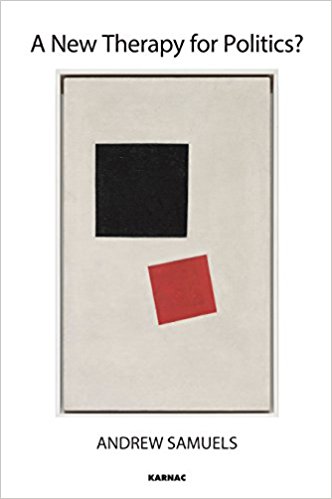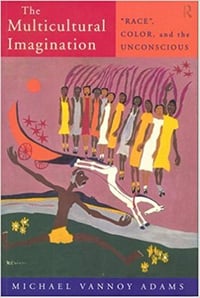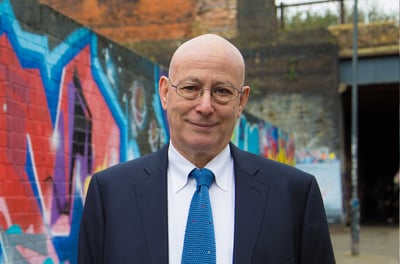Where Politics, Psyche, and Community Converge: An Interview with Andrew Samuels
A Guest Post by Bonnie Bright, Ph.D.
 U.K.-based psychotherapist and activist, Andrew Samuels has a long history as a consultant to political clients on the presidential and prime ministerial level. While Samuels first published Politics on the Couch in 2001 and The Political Psyche in 2015, his newest book, A New Therapy for Politics? [1] delves ever more deeply into the intersection between psychotherapy and politics and lends a critical eye to his own chosen profession in an effort to bring the two together.
U.K.-based psychotherapist and activist, Andrew Samuels has a long history as a consultant to political clients on the presidential and prime ministerial level. While Samuels first published Politics on the Couch in 2001 and The Political Psyche in 2015, his newest book, A New Therapy for Politics? [1] delves ever more deeply into the intersection between psychotherapy and politics and lends a critical eye to his own chosen profession in an effort to bring the two together.
Sigmund Freud and C. G. Jung, both pioneers in the field of psychotherapy, wrote about politics over the course of their careers, Samuels points out, but psychotherapists have generally been “magnificently unsuccessful” in creating a significant contribution to the political arena.
Jung was very aware of “how the political world penetrates into the silent, pure space of the consulting room,” Samuels maintains, but most psychotherapists don’t have much of a reach outside their own community of therapeutic professionals. Notably, they tend to be completely caught up in their own language and their own concept. The inclination to maintain that “everything is psychological” results in hierarchical dynamics where psychologists or therapists place themselves above the everyday fray that makes up politics.
This positioning weakens their capacity to add value or engage in a meaningful way, a position that is exacerbated by ineffective means of communicating. There is often a tendency among the psychotherapy profession to “descend into psychobabble,” Samuels suggests. They end up speaking in terms of projection, paranoia, or archetypes (especially for Jungians), and generally making themselves completely incomprehensible to ordinary people. On top of that, historically, the psychotherapy profession has been a rather un-diverse one, with a track record of shortcomings related to ethnic/racial/cultural or sexual minorities.
In an era when psychotherapists have been criticized for psychoanalyzing political figures from a distance, Samuels gathers inspiration from his longstanding (and sometimes difficult and disillusioning) experience, both as a consultant in the political arena and as a psychotherapist, and he has dedicated himself to identifying ways to craft a meaningful contribution.
“The solution is, don't do it alone,” he offers. The first thing to do is to admit the profession is challenged in this arena, and then find other groups who are responsive to “therapy thinking” to do it with. While its sometimes all too easy to give in to the urge to merely write about psychotherapeutic perspectives in an effort to prove our theories are correct, getting hands-on experience with other groups of actors including environmentalists and those working for economic or social justice, among other disciplines is crucial.
It’s also critical to be aware of how we allow too much reflection to inhibit our capacity for action. To use Hamlet's language, "Reflection is sicklied over with a pale cast of thought, and we lose the name of action,” Samuels points out. Therapists are brilliant at sitting, thinking, and reflecting, but sometimes you have to get into the “roughness” of politics.
Samuels, who is in his late sixties, still participates in demonstrations on an ongoing basis, insisting that “If you are neutral in a situation of inequality, then you're not being neutral. You are siding with the powerful in that situation.” In working with individuals in therapy, the best route of action might be finding balance between opposing sides; in finding moderation, he declares, but when it comes to politics, the only psychological approach that works is one of passion. There are always going to be opposing points of view, and we can’t ignore the opportunity to speak up and take action.
Recently, Samuels has noticed a "political turn" relating to psychotherapy, psychoanalysis, and Jungian analysis. His research with other clinicians has revealed a strong interest in improving the way political and collective perspectives are integrated into responsible, relational clinical work, and we are doing better at it, he admits. However, many feel their clinical training has not equipped them for the task.
As a result, he has identified a real need to find ways that are congruent with good clinical practice which will enable therapists to think about how to work with a person's political concerns and obsessions, and even—or maybe especially—to work with people whose political opinions are contradictory and digressive from their own. Bringing political material into the consulting room offers therapists the ethical base to get what they learn in the consulting room into the political arena, Samuels affirms. If it’s done systematically and professionally, with structure and intention, that act makes it a “two-way street” where the political angle can be taken back out into the world.
Therapists work with clients who have opposing views from their own all the time, he points out. Why would an individual’s political views be treated any differently than say, different views on art? Politics is all about dispute and struggle and disagreement, so it’s critical that somewhere between silence and the outrage, there's a path that gets worked out by the clinician. Only then can the clinician leave the consulting room and go into activist circles.
Samuels, who will be expounding on these ideas at an upcoming October conference entitled “Up Against the Wall: Politics, Community, Psyche” at Pacifica Graduate Institute in Santa Barbara, CA, will offer an interactive approach in what he calls a “political clinic.” His background in theater comes into play as he sets up situations where people can deeply explore and share the psychological intricacies of their personal political views in ways that go beyond the “traditional psychodynamic quest of therapy.”
Questions such as “How is politics dealt with and transmitted in the family?”; “Are your personal political engagements aligned with or along the same lines as your parents?” or “Do you talk about that with your therapist or analyst?” may all provide fodder for a new kind of engagement and interaction in an environment where nonverbal activities such as sculpting, sound, movement, improvisation, and “political fantasy” initiate powerful responses. These questions and activities may ultimately generate additional routes of inquiry, including those surrounding money, which is inherently linked. How did your mother and father handle money? What did you feel about that, and how do you handle money now? How is money transmitted in the family? What about the gender dimensions of money? Are you satisfied with how you handle money in your current familial relationships or in your life? This kind of systemized approach offered within the political clinic has proven itself over and over, and creates an “absolutely sensational experience” for participants, Samuels relays. It gets people away from overtly theoretical approaches and opens the door for a more systemic and integrated approach through a diverse community, one of the critical factors in bringing psychology and politics together.
Samuels is fond of emphasizing the importance of the integrated approach, saying “When there's a public committee or policy commission to address a social issue, for heaven sake, let's try to get a therapist onto that commission…but for God's sake, let's never have a committee entirely of therapists. That would be a complete nightmare!” Samuels laughs when he makes this assertion, but his point is well taken. There is an increasingly urgent need to move beyond the psychological to a “psychosocial” approach. These things are deeply integrated, he insists. “We don't just project our stuff into the world; nor do we just absorb what the world has in it. It's a mixture.”
Samuels goes on to explain another relevant term he coined, “social spirituality,” which describes how when a group of people get together to do something political, sometimes the “togetherness of it transcends the social and makes it into something more spiritual.”
Unfortunately, as so often is the case, this concept can occur to groups of all kinds. It’s not always groups interested in social or environmental issues that experience the feeling of social spirituality, Samuels points out. Other groups, including fascist, may also feel spiritually motivated or rewarded for their group efforts. This is indicative of the shadow of spirituality, which relates to the politics of the psychology profession itself, where the biggest element in the shadow of spirituality is elitism.
Elitism, the feeling that you better, smarter, or more special than others, is a political phenomenon in the Western-developed countries at the moment. Across the board—from spirituality to economics—elitism is a genuine problem because inequality is largely unspoken, and the therapy world is not immune. Therapist and client are often not equal; that is easy to notice. The system is also organized hierarchically, Samuels suggests. Some well-known therapists who have achieved a certain level of reputation are invited to give lectures to audiences who are often very similar to them. The field of psychotherapy has yet to embrace diversity in any meaningful, inclusive way.
Jung’s controversial writings about both Jews and Africans contributes to the issue. Samuels insists, and rightly so, on maintaining transparency in acknowledging and addressing Jung’s anti-Semitic leanings. Samuels dedicates nearly 200 pages to the topic in A New Therapy for Politics? The contemporary Jungian community has made a fair amount of effort to inquire into Jung’s limiting beliefs on the matter, and to apologize for it where appropriate, he asserts, but when it comes to writings of "Africans," we've hardly begun.
 There has been much debate about this in the Jungian world, and it contributes to the aforementioned issue of inequality. Samuels personally maintains that people of color may be put off from becoming therapists, due, in part, to Jung’s perspective. “There's a real difficulty in understanding that there is something for the Jungian professional community to own, to take responsibility for,” Samuels states. He recommends Jungian Michael Vannoy Adams' book, The Multicultural Imagination: "Race", Color, and the Unconscious [2], for those individuals interested in inquiring into the way in which psychoanalysis contributes to our understanding of 'racial' identity. Other Jungians making strides into this inquiry include Polly Young-Eisendrath, Samuels himself, and Fanny Brewster [3]—the “absolute star of this field right now”—who will also be presenting at the October Pacifica conference, “Up Against the Wall: Politics, Community, Psyche.”
There has been much debate about this in the Jungian world, and it contributes to the aforementioned issue of inequality. Samuels personally maintains that people of color may be put off from becoming therapists, due, in part, to Jung’s perspective. “There's a real difficulty in understanding that there is something for the Jungian professional community to own, to take responsibility for,” Samuels states. He recommends Jungian Michael Vannoy Adams' book, The Multicultural Imagination: "Race", Color, and the Unconscious [2], for those individuals interested in inquiring into the way in which psychoanalysis contributes to our understanding of 'racial' identity. Other Jungians making strides into this inquiry include Polly Young-Eisendrath, Samuels himself, and Fanny Brewster [3]—the “absolute star of this field right now”—who will also be presenting at the October Pacifica conference, “Up Against the Wall: Politics, Community, Psyche.”
“I think we can do what we did for Jung's writings on Jewish people in relation to what Fanny calls ‘Africanists,’ ” submits Samuels, whose summer holiday reading focused mostly on slavery. While Jung made powerful contributions to the field of psychology, it is critical that we examine the ways in which he erred and to avoid idealizing him. This perspective also reinforces why the term, "Post-Jungian," which Samuels coined in the 1980's is still so relevant today, because it means one is connected to Jung, but also willing to be critical.
In that same vein, it’s important that we assess our perspective on what depth psychology commonly refers to as “the Other,” Samuels contends. It is a necessary reparation to acknowledge and engage and attempt to redefine the idea of the Other in terms of Colonialism, for heteronormativity, and for masculinity, among those themes that dominate the modern world. However, much of that work still suffers from what's still called an “Orientalist” aspect. In effect, mixed in with “the admiration and a scholarship of the ways and the culture of the Other is a kind of sickening, patronizing” approach. While the awareness may be an honoring or a repairing of historic injuries done by the majority—the white majority—there is a cautionary aspect to the approach which can evolve into a kind of “control element.”
Samuels maintains that we must be patently aware of how the psychotherapy and academic worlds maintain a fascination with the idea of the Other by being on guard about the serious drawbacks related to the “secret saccharin admiration which is actually controlling, patronizing and just another kind of Colonialism.”
Samuels’ contribution to the intersection of psychology and politics is clearly profound, and the ideas he introduces provide much food for thought. While clearly not afraid to locate himself squarely in the middle of a controversial discussion, he also remains open to new understanding of the unfolding and seems to welcome the engagement. It is there, after all, that new attitudes and actions may emerge—a process so greatly needed in today’s times of political controversy and crisis on so many levels.
Listen to the full audio interview with Andrew Samuels here (approx. 39 mins):
Watch the full interview with Andrew Samuels on YouTube here (approx. 39 mins):
Learn more about the October 2017 conference, “Up Against the Wall: Politics, Community, Psyche” featuring Andrew Samuels at the retreat.pacifica.edu
Learn more about Andrew and his work at http://www.andrewsamuels.com
[1] Read a book review for A New Therapy for Politics? at http://www.contemporarypsychotherapy.org/
[2] Check out the book, The Multicultural Imagination: "Race", Color, and the Unconscious, by Michael Vannoy Adams at amazon.com
[3] Access a recent interview with Fanny Brewster for “Dreams, Calling, Suffering, and Individuation: Finding Light in the Darkness” at http://www.pacificapost.com/
 Andrew Samuels, Ph.D., is recognized internationally as one of the foremost political commentators and theorists from the perspectives of psychotherapy and depth psychology. He has worked as a consultant with political leaders, parties and activist groups in several countries, including the United States. He also consults to Britain’s National Health Service. He draws on a wide range of approaches to psyche, including post-Jungian, relational psychoanalytic and humanistic ideas. But he roots his work in citizens’ lived experience, and in what can be learned from therapy work carried out with political awareness. While Andrew does not disguise his background in progressive and left-wing politics and his commitment to diversity and equality, he remains open-minded and celebrates many different takes on social and political issues.
Andrew Samuels, Ph.D., is recognized internationally as one of the foremost political commentators and theorists from the perspectives of psychotherapy and depth psychology. He has worked as a consultant with political leaders, parties and activist groups in several countries, including the United States. He also consults to Britain’s National Health Service. He draws on a wide range of approaches to psyche, including post-Jungian, relational psychoanalytic and humanistic ideas. But he roots his work in citizens’ lived experience, and in what can be learned from therapy work carried out with political awareness. While Andrew does not disguise his background in progressive and left-wing politics and his commitment to diversity and equality, he remains open-minded and celebrates many different takes on social and political issues.
 Bonnie Bright, Ph.D., is a graduate of Pacifica’s Depth Psychology program, and the founder of Depth Psychology Alliance, a free online community for everyone interested in depth psychologies. She also founded DepthList.com, a free-to-search database of Jungian and depth psychology-oriented practitioners, and she is the creator and executive editor of Depth Insights, a semi-annual scholarly journal. Bonnie regularly produces audio and video interviews on depth psychological topics. She has completed 2-year certifications in Archetypal Pattern Analysis via the Assisi Institute and in Technologies of the Sacred with West African elder Malidoma Somé, and she has trained extensively in Holotropic Breathwork™ and the Enneagram.
Bonnie Bright, Ph.D., is a graduate of Pacifica’s Depth Psychology program, and the founder of Depth Psychology Alliance, a free online community for everyone interested in depth psychologies. She also founded DepthList.com, a free-to-search database of Jungian and depth psychology-oriented practitioners, and she is the creator and executive editor of Depth Insights, a semi-annual scholarly journal. Bonnie regularly produces audio and video interviews on depth psychological topics. She has completed 2-year certifications in Archetypal Pattern Analysis via the Assisi Institute and in Technologies of the Sacred with West African elder Malidoma Somé, and she has trained extensively in Holotropic Breathwork™ and the Enneagram.



